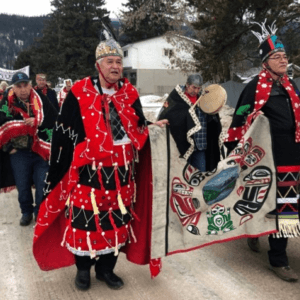The People’s Republic of China does not recognize the term “indigenous people” for its 55 ethnic minorities (incl. groups in Taiwan), even though in 1990 the country declared itself a supporter of indigenous rights elsewhere. Instead, China calls its various ethnic groups “ethnic minorities” (少数民族). The difference in terminology can be explained in historic terms....
Tag: 61
Indigenous Populations Lead Climate Justice Movements in Canada
The Indigenous population in Canada (5%) is one of the largest among countries that share a similar colonial history. Statistics Canada (September 2022) reports 1,807,250 Indigenous peoples involving three very diverse groups/populations – First Nations (1,048,405), Métis (624,220) and Inuit (70,545). The remaining include multiple Indigenous identities reflected in over 70 Indigenous languages. Of the...
Illegal Mining and Climate Change in Brazil Threatens the Livelihood of Indigenous Peoples
Yanomami women and children: extraction of minerals within the Indigenous Land not only contaminates rivers and people but also destroys forests and affects the indigenous way of life, imposing restrictions on movement within their lands INDIGENOUS PEOPLES IN BRAZIL, THE YANOMANI TRAGEDY AND THE PEOPLE’S CONTRIBUTION TO FIGHT CLIMATE CHANGE The Indians are a...
‘Caring for Country’ Describes the Sustainable Practices Used by First Nations People to Manage Land and Seascapes in Australia
Aboriginal and Torres Strait Islander people of Australia have the longest continuing culture on Earth. This culture is composed of a multiplicity of sovereign Nations interacting through established laws and customs for 60,000 years. These Nations, laws and customs all continue today. In the 2023 census 812,728 people identified as being of Aboriginal and/or Torres...





